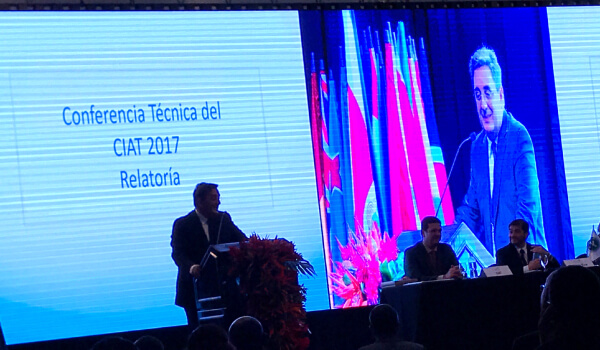Three brief accounts of a great Conference (Wednesday)

(….)
The last day of the Conference began with a presentation by Xenia de García, from El Salvador, who described the assistance and contribution from her Administration for concluding Phases I and II of the Peer Review of the OECD’s Information Exchange Global Forum, which process has been successful and has allowed for implementing a fully operational information exchange unit. Likewise, the representative of Peru, Mary León Vasquez noted how the implementation of a transfer pricing policy requires normative, structural and operational changes for developing strongly specialized and multidisciplinary teams, firmly coordinated with the examination area. In her presentation, she described some harmful transfer pricing planning schemes and the specific measures examined and applied in her country for combatting the manipulation of transfer pricing of primary goods. Continuing with the national experiences, Martin Barciela, from Panama, referred to the significant modernization effort undertaken by his country’s General Directorate of Revenues. The latter has counted on the contribution and assistance from various actors, such as CIAT, IMF, IDB, SAT of Mexico and in particular, with the firm commitment of the Panamanian Administration, which was perhaps the crucial element for successfully carrying out the reforms. A good example thereof has been the implementation of FATCA in Panama –which shall continue with CRS and the Inclusive Framework – always reinforcing the confidentiality and data security requisites.
Mustafá Amini, from The Netherlands, initiated another round of presentations focused on the challenges posed by harmful tax planning. He also explained his country’s efforts for reducing international tax evasion based on the proposals arising from the European Union, as evidenced in the exchange of information on “tax rulings” which has such a great incidence in The Netherlands. The keys to this challenge are: “Transparency, cooperation, resources and technology”.
Stéfano Gessuelli, representative of Italy, conveyed numerous messages and ideas in relation to the struggle against tax fraud. The roadmap should include partial audits –vis-a-vis the general ones of unprescribed periods -, and the need to take advantage of the information arising from criminal proceedings. The importance of international tax fraud was reflected in one data: this type of cases represents over 40 per cent of the audit work in his country. He advocated for the development of Artificial Intelligence tools to face this complex phenomenon, noting that with this innovative technology it may be said that “the future is already here”. Ángel González, representative of France, explained the handling of tax planning cases. This is done through an adequate normative framework which reinforces transparency; the adoption of anti-abuse rules and limitation of deductibility of expenses originated in territories with privileged taxation and a forthright relationship with the taxpayers (publication of fraud schemes, binding consultations, etc…) as well as through a sanctioning system -penal and administrative- that is well designed, balanced and feasible. The response to international fraud and evasion must necessarily be global and that is the challenge to be overcome. Finally, Jorge Ramírez, from Mexico, provided a detailed review of the process of implementation of electronic invoicing in said country, which has become the mainstay of the Mexican tax administration, noting how, so far this year, over 3 billion invoices have been processed and how there has been a significant reduction in tax fraud.
Immediately thereafter, there was a Round Table, headed by the CIAT Executive Secretary, Mr. Márcio F. Verdi, with the participation of Michael Snaauw from Canada, Santiago Menéndez Menéndez from Spain and Marta González Ayala from Paraguay, currently the CIAT President. They discussed each country’s experiences with the implementation of the BEPS initiatives, in particular, the challenges posed in each of their administrations. In this table, which was open for discussion, good number of representatives from Argentina, Ecuador and Brazil, as well as such organizations as the International Monetary Fund, World Bank and United Nations were allowed to express their viewpoints on the issues that had been considered throughout the three days of the Technical Conference in San Jose, Costa Rica. And the next one will be held… in the magical white city, in Lisbon –Portugal.
1,518 total views, 1 views today
